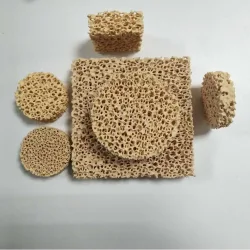Here are some key aspects of ceramic filters
2023-12-28
Ceramic filters are a type of water filtration technology that uses ceramic materials to remove impurities and particles from water. These filters are commonly employed in various applications, including household water purification, industrial processes, and portable water treatment. Ceramic filters are known for their durability, long lifespan, and effectiveness in removing contaminants. Here are some key aspects of ceramic filters:
1. Composition:
- Material: Ceramic filters are typically made from porous ceramic materials such as diatomaceous earth, clay, or other natural materials.
- Pore Structure: The ceramic material is structured with fine pores, allowing water to pass through while trapping impurities.
2. Filtration Mechanism:
- Physical Filtration: The primary mechanism of ceramic filters is physical filtration, where particles and contaminants are physically blocked by the porous structure of the ceramic material.
- Microfiltration: Ceramic filters are capable of microfiltration, removing particles down to the submicron level.
3. Applications:
- Household Water Filtration: Ceramic filters are commonly used in household water filtration systems, such as countertop or gravity-fed filters, to improve the taste and quality of drinking water.
- Industrial Filtration: In industrial settings, ceramic filters may be used for the filtration of liquids in processes such as wastewater treatment, beverage production, and pharmaceutical manufacturing.
- Portable Water Treatment: Ceramic filters are employed in portable water treatment devices for camping, emergency preparedness, and humanitarian aid in areas with limited access to clean water.
4. Advantages:
- Durability: Ceramic filters are durable and resistant to degradation, providing a long lifespan.
- Effective Filtration: They are effective in removing a wide range of contaminants, including bacteria, protozoa, sediment, and some larger particles.
- Ease of Use: Many ceramic filters are simple to use and maintain, requiring basic cleaning to ensure continued effectiveness.
5. Limitations:
- Limited Removal of Chemicals: Ceramic filters primarily remove physical contaminants and may have limitations in removing certain dissolved chemicals or contaminants.
- Clogging: Over time, ceramic filters may become clogged with accumulated impurities, reducing water flow. Regular cleaning is necessary to maintain efficiency.
6. Maintenance:
- Cleaning: Periodic cleaning is required to remove accumulated impurities and prevent clogging. The cleaning process typically involves scrubbing or brushing the surface of the ceramic element.
- Replacement: While ceramic filters have a long lifespan, the ceramic element may need replacement after extended use or if it becomes damaged.
7. Filter Configurations:
- Cartridge Filters: Ceramic filter cartridges are common in various water filtration systems, where water passes through the ceramic material.
- Candle Filters: Some ceramic filters are shaped like candles, and water is filtered as it passes through the cylindrical structure.
8. Additional Treatment:
- Silver Impregnation: Some ceramic filters are impregnated with silver particles, which can provide additional antimicrobial properties by inhibiting the growth of bacteria.
Ceramic filters are a reliable and cost-effective option for water filtration in diverse settings. They are particularly valuable in situations where a durable, long-lasting, and simple filtration solution is needed to improve water quality.



